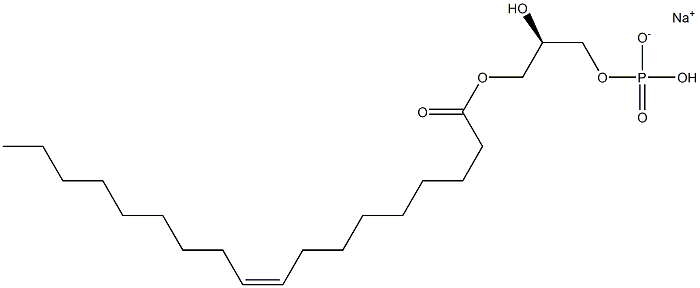| Identification | Back Directory | [Name]
1-O-9Z-Octadecenoyl-sn-glyceryl-3-phosphoricacidsodiumsalt | [CAS]
325465-93-8 | [Synonyms]
18:1 LPA
18:1 Lyso PA
PA(18:1(9Z)/0:0)
1-Oleoyl lysophospha
Lysophosphatidic Acid
Lysophosphatidic acid (LPA)
Lysophosphatidic acid (Oleyl form)
1-Oleoyl lysophosphatidic acid (sodium)
Sodium (R,Z)-2-hydroxy-3-(oleoyloxy)propyl hydrogenphosphate
1-OLEOYL-2-HYDROXY-SN-GLYCERO-3-PHOSPHATE (SODIUM SALT);18:1 LYSO PA;PA(18:1(9Z)/0:0);18:1 LPA;O-LPA | [Molecular Formula]
C21H40NaO7P | [MDL Number]
MFCD00133427 | [MOL File]
325465-93-8.mol | [Molecular Weight]
458.502 |
| Chemical Properties | Back Directory | [storage temp. ]
Inert atmosphere,Store in freezer, under -20°C | [solubility ]
Soluble in DMSO (up to 1 mg/ml with warming) or in Water (up to 10 mg/ml with warming). | [form ]
Waxy solid. | [color ]
White | [Water Solubility ]
Soluble in water up to 5mg/ml with sonication | [Stability:]
Stable for 2 years from date of purchase as supplied. Solutions in DMSO or distilled water may be stored at -20° for up to 1 month. |
| Hazard Information | Back Directory | [Description]
Lysophosphatidic acid (325465-93-8) is a multifunctional intercellular bioactive phospholipid.1?Stimulates the growth of a variety of cells including fibroblasts, vascular smooth muscle cells, endothelial cells and keratinocytes among others.1?Acts as a proliferative and anti-apoptotic factor.2?Lysophophatidic acid is an agonist at LPA1?(EDG-2), LPA2?(EDG-4) and LPA3?(EDG-7) receptors.3?LPA-primed astrocytes induce axonal outgrowth of cortical progenitors.4 | [Uses]
It is an endogenous agonist for LPA1?and LPA2?receptors. LPA does not induce angiogenesis, but has effects on endothelial cell physiology that are similar to those of sphingosine 1-phosphate. Induces cell migration of cancer and non-cancer cells. LPA has also been described to potentiate acetylchloine receptor currents by G-protein-mediated activation of Ca2+-dependent/independent protein kinase C. | [in vitro]
lpa could mediate signal transduction via edg/lpa receptor, inducing the proliferation, migration, adhesion and antiapoptotic function of tumor cells. additionally, lpa was found to elicit upregulation of vegf, leading to an indirect influence on initiation and progression of malignancies. lpa could also stimulate matrix metalloproteinase secretion and tumor angiogenesis factor [1]. | [in vivo]
lpa was tested for its vascular remodeling effect in a rat model of hypoxic pulmonary hypertension. serum from animals in the hypoxic group showed higher chemoattractant properties toward rat primary lung fibroblasts, and such cell migration increase was prevented by the lpa receptor 1 and 3 antagonists. lpa also found to increase adhesive properties of human pulmonary artery endothelial cells, via the activation of lpa receptor 1 or 3 [1]. | [storage]
Store at -20°C | [References]
1) Moolenaar?et al. (1995),?Lysophosphatidic acid, a multifunctional phospholipid messenger; J. Biol. Chem.,?270?12949
2) Levine?et al. (1997),?Lysophosphatidic acid; a novel growth and survival factor for renal proximal tubular cells; Am. J. Physiol.,?273?F575
3) Goetzl and An (1998),?Diversity of cellular receptors and functions for the lysophospholipid growth factors lysophosphatidic acid and sphingosine 1-phosphate; FASEB J.,?12?1589
4) Spohr?et al. (2014),?LPA-primed astrocytes induce axonal outgrowth of cortical progenitors by activating PKA signaling pathways and modulating extracellular matrix proteins; Front Cell Neurosci.,?8?296 |
|
| Company Name: |
BOC Sciences
|
| Tel: |
|
| Website: |
https://www.bocsci.com |
|





